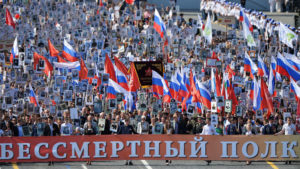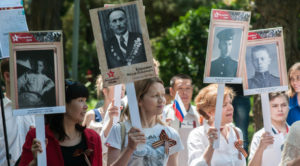Avec la prochaine libération d'Alep, le rêve des charlatans de la révolution syrienne vire au cauchemar, il prend des allures d'enfer dantesque. Après des années de proclamations ronflantes sur la "victoire imminente" des insurgés, cette aventure qui n'avait de révolution que le nom tourne au désastre. Elle s'effondre de toutes parts, disparaissant sous ses propres décombres. Après les rodomontades, voici la débandade ! Hagards, hirsutes, les desperados du takfir, exhumant de leur trou leurs carcasses fatiguées, finiront par se rendre les uns après les autres. Alep devait être la "capitale de la révolution syrienne". Erreur. Elle est le cimetière d'une contre-révolution sponsorisée par Riyad. Abandonnant le terrain face à l'armée nationale, les mercenaires wahhabites, désormais, ont le choix entre la mort ou la reddition.
En sonnant le glas d'une insurrection télé-guidée de l'étranger, la débâcle d'Alep dissipe une énorme supercherie. Il aura fallu six années de malheur pour que cette tragédie provoquée et entretenue par une avalanche de pétrodollars sur fond de crise régionale apparaisse sous son vrai jour. Ce n'était pas une révolution, mais une opération ratée de "regime change" voulue par Washington et ses alliés. De l'aveu d'Hillary Clinton elle-même, cette opération fut menée en utilisant des organisations terroristes dont la maison-mère (Al-Qaida) était déjà une coproduction saoudo-américaine dans les années 80. Al-Nosra, Daech et consorts, à leur tour, furent mis au service d'une stratégie du chaos qui visait à pulvériser les Etats de la région au profit d'entités ethno-confessionnelles dont la fragmentation garantirait la docilité.
Il en résulta une farce sanglante, désormais ensevelie sous les gravats de cette ville martyrisée par une guerre impitoyable que provoqua l'appétit de domination impérialiste allié au fanatisme sponsorisé de desperados crétinisés jusqu'au dernier centimètre cube de leur cerveau. Le pire n'est jamais sûr, dit-on, mais on eut droit à tout ce qu'il était possible de faire, y compris l'inimaginable ! Des dirigeants occidentaux qui prétendent combattre les terroristes tout en leur procurant des armes au nom des droits de l'homme. Des puissances étrangères qui infligent un embargo sur les médicaments à des populations civiles coupables de ne pas combattre leur gouvernement. Des familles royales sanguinaires et débauchées qui donnent des leçons de démocratie tout en sponsorisant la terreur. Des intellectuels français qui exigent comme un impératif moral le bombardement d'un pays qui ne nous a rien fait. C'est un triste privilège, mais il faut reconnaître que le drame syrien a généré un impressionnant florilège de saloperies.
Qu'on se souvienne seulement avec quels accents enflammés les chantres hexagonaux de cette révolution-bidon nous serinaient depuis six ans qu'une glorieuse insurrection allait mettre à bas l'odieuse tyrannie ! Jour après jour, ils noyaient hypocritement d'un écran de fumée humanitaire la haine que leur inspirait cet Etat syrien dont le seul tort était de rester debout face à la coalition prédatrice des puissances occidentales et des pétromonarchies corrompues. Sans vergogne, ils couvraient de leur clameur mensongère, en les attribuant aux soldats syriens défendant leur patrie menacée, les atrocités commises par des bandes criminelles dont l'ambition monomaniaque était d'imposer la charia wahhabite et de liquider les minorités confessionnelles.
On les a vus, on les a entendus pendant de longues années, ces charlatans. Les Jean-Pierre Filiu, François Burgat, Jean-Paul Chagnollaud, Pascal Boniface, Dominique Vidal, Ziad Majed, Romain Caillet, Bruno Tertrais et consorts intoxiquèrent l'opinion de leurs mensonges en respectant scrupuleusement le cahier des charges atlantiste. Experts en affabulation, ces mythomanes multi-cartes ont craché sur la Syrie, son peuple, son armée et son gouvernement. Ils n'ont cessé de les calomnier, relayés par des journalistes dont l'inculture n'avait d'égale que leur partialité. Niant l'évidence d'un mercenariat international financé par les pétromonarchies, ces pseudo-progressistes se sont rangés, servilement, du côté d'un obscurantisme wahhabite mis au service de l'impérialisme occidental. Prenant des grands airs, ils donnaient des leçons d'humanisme tout en tressant des couronnes aux milices mafieuses et sectaires qui détruisaient la Syrie. Faisant le tri entre les bonnes et les mauvaises victimes, ils brandissaient les droits de l'homme côté cour et soutenaient les tortionnaires takfiris côté jardin.
Pour incriminer le gouvernement syrien et ses alliés, ils voulaient enrôler au service de leur cause frelatée le sort des civils assiégés à Alep, mais en omettant de dire que 80% de ces civils se trouvaient dans les quartiers protégés par le gouvernement, et que les autres, retenus prisonniers par les djihadistes, étaient utilisés par ces glorieux "révolutionnaires" comme boucliers humains. Ils voulaient nous faire croire que l'aviation russe bombardait les hôpitaux d'Alep, mais sans préciser que la majorité des hôpitaux étaient à Alep-Ouest et subissaient le feu incessant et meurtrier des mortiers rebelles. Orchestrant une indignation sélective fondée sur le déni de réalité permanent, ils ont accrédité cette monumentale escroquerie des "Casques Blancs", brillamment démasquée par une courageuse journaliste, Vanessa Beeley, qui administra à ces fumistes une leçon définitive d'honnêteté intellectuelle et de probité professionnelle.
La reconquête de la deuxième ville de Syrie par l'armée nationale ne rend pas seulement l'espoir au peuple syrien, qui aperçoit désormais le bout du tunnel après tant de souffrances. Cette victoire d'une armée majoritairement composée de conscrits de confession sunnite (comme l'a récemment rappelé le géographe et excellent analyste Fabrice Balanche) ne dissipe pas seulement le mythe d'une guerre confessionnelle forgé de toutes pièces par les pousse-au-crime du wahhabisme. Cette reconquête balaye aussi d'un grand courant d'air frais, en ce victorieux mois de décembre, les miasmes putrides largués dans l'atmosphère par six années de propagande à grande échelle.
Orchestrée par les larbins de l'impérialisme US et les collabos de l'obscurantisme wahhabite (ce sont souvent les mêmes), cette propagande a diabolisé le gouvernement syrien en lui attribuant la responsabilité des crimes commis par ses adversaires. Elle a aussi diabolisé la Russie, dont l'intervention militaire en Syrie, contrairement à celle des pays de l'OTAN, respecte le droit international et frappe sans lésiner les terroristes de tous poils. Il faut vivre en France, ce pays de masochistes, pour voir la haine de la Russie se déchaîner, avec une rare violence, chaque fois qu'elle fait reculer les terroristes. A chaque défaite infligée sur le terrain aux commanditaires du massacre du Bataclan, nos charlatans hexagonaux, du gouvernement aux médias, se répandent en clameurs indignées !
Le drame syrien est un révélateur chimique. Jamais depuis Vichy notre intelligentsia ne s'était autant vautrée dans la fange, jamais elle n'avait mis un tel point de déshonneur à célébrer l'esprit collabo. Mais voilà, la roue tourne. Que reste-t-il aujourd'hui du dogme interventionniste cher aux néocons, au moment où Donald Trump le dénonce, où Vladimir Poutine mène le bal au Moyen-Orient et où l'Etat syrien expédie les mercenaires de Riyad dans les poubelles de l'histoire ? Doublement orphelins, les charlatans du droit-de-l'hommisme (à géométrie variable) risquent de perdre leur héros yankee, fatigué de mener des guerres stupides, et leur piétaille moyen-orientale, taillée en pièces par cette armée syrienne qu'ils méprisaient. Pour les charlatans, décidément, la fête est finie.
Bruno Guigue (07/12/2016) Bruno Guigue, né en 1962 à Toulouse, est un ancien haut fonctionnaire, chercheur en philosophie politique et analyste politique français.


